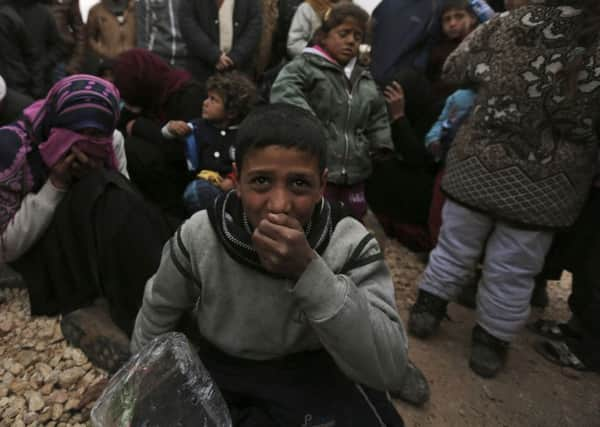Ted R. Bromund: War in Syria is lost... now let's look to future


The question now is what we do next.
You can tell we’ve lost the war because most of the fighting is over and Assad is still in charge. Worse, his backers, Iran and Russia, make no secret of their contempt for the West. If the ceasefire isn’t complete, it’s because Russia and Syria still want to improve their position around Aleppo.
Yes, the battle against Daesh – the so-called Islamic State – goes on, as it must. And we will likely squeeze them down, though not eliminate them.
Advertisement
Hide AdAdvertisement
Hide AdBut the threat of radical Islam is far larger than IS. Al-Qaida was there before them, and it will absorb the remains of IS and carry on the jihad.
And about that ceasefire: The question isn’t whether it’s working. The mere fact that it nominally exists is proof that we’ve lost. The West never figured out what its goal in Syria was, but it was certainly not to end up with a million refugees in Europe.
The fact that we’ve not fought doesn’t mean we’ve not lost. President Obama said he wanted Assad to go.
But he was never serious about making that happen. The ceasefire reduces the US to the role of a fourth linesman judging Russian infractions.
Advertisement
Hide AdAdvertisement
Hide AdBy stepping off the pitch, we’ve taken ourselves out of the game. But the game goes on anyhow. By focusing on whether the ceasefire is holding, we’re distracting ourselves from the rest of the board, in Syria and elsewhere. Russia hasn’t agreed to a ceasefire because it wants to stop the fighting: if it did, it would never have intervened in Syria.
Russia is using an old ploy: commit an outrage, then encourage the West to start treating it as a reliable partner by pretending to be co-operative. I predict we will soon hear encouraging rumours about Russia’s desire to stabilise Ukraine (and, of course, for the EU to lift its sanctions).
What are we to do? We must begin by recognising our defeat. Then we need to remember that not all the consequences of defeat will be bad for us, if we are determined to make use of them.
Assad’s survival, and all it means for Iranian and Russian influence, will provoke reactions across the wider Middle East. Right now, we cannot know what those reactions will be. So our first goal must be to gain time: we need to prevent further decay in our position until we can see more clearly.
Advertisement
Hide AdAdvertisement
Hide AdIf we are to do that, we must prevent Assad’s most devastating weapon – the refugees – from being used against us again. If we cannot do this, we will never be able to persist in any policy, because we will be at Assad’s mercy, and the mercy of the Russian air power that helped drive the refugee flow.
The main refugee routes run through Turkey and across the Mediterranean. The West has the naval power to close the sea. It must be used. European leaders, beginning with Angela Merkel, must make it clear that the door is shut, and that all intercepted refugees will be interned on a convenient Greek island, treated humanely, and returned to their port of departure at a time of the West’s choosing.
Greece must be generously compensated for this use of its territory. Then we must put the strongest pressure on Turkey not to allow more refugees to cross into Europe.
I acknowledge, with gratitude, that Turkey is already a temporary home to over two million refugees. But this is no time to be delicate. The choice we give the Turks must be simple: we will help them, but only if they help us.
Advertisement
Hide AdAdvertisement
Hide AdNone of this is cruel or inhumane. What is cruel and inhumane is giving Assad and the Russians an opening to shape our policies by bombing civilians onto Europe’s shores. We must prove we cannot be moved by this threat. Otherwise, it will be used against us, and the civilians, whenever it is convenient.
Next, we must look to Europe. The Syrian ceasefire is a sign that Russia is ready to move on to another target. The threat of a Russian war in the Baltics is clear. We must deter it. The Supreme Commander of Nato must again have the authority to act in times of crisis, and Nato must make it clear, through the deployment of Nato forces, that we are firmly committed to defending the Baltic nations.
Finally, we must look back to the Middle East. In time – and it will not take very long – the consequences of Assad’s and Iran’s victory will become clearer. We can already see its reverberations in Saudi Arabia.
If we are determined, we can mobilise the consequences of Assad’s victory against him. But while we need time, we have little of it. The board is set, and the pieces are moving.
• Ted R. Bromund is a senior research fellow in Anglo-American Relations, based at The Margaret Thatcher Center for Freedom at The Heritage Foundation in Washington.